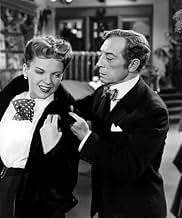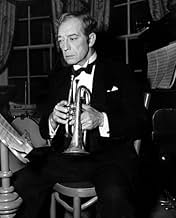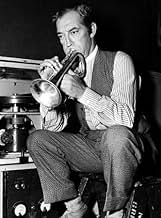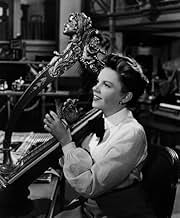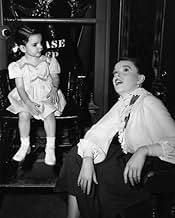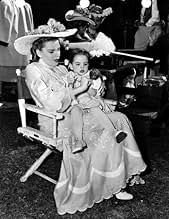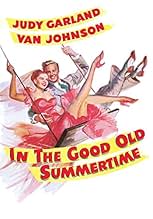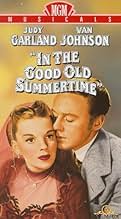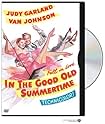VALUTAZIONE IMDb
7,1/10
4399
LA TUA VALUTAZIONE
Aggiungi una trama nella tua linguaIn turn-of-the century America, Andrew and Veronica are co-workers in a music shop who dislike one another during business hours but unwittingly carry on an anonymous romance through the mai... Leggi tuttoIn turn-of-the century America, Andrew and Veronica are co-workers in a music shop who dislike one another during business hours but unwittingly carry on an anonymous romance through the mail.In turn-of-the century America, Andrew and Veronica are co-workers in a music shop who dislike one another during business hours but unwittingly carry on an anonymous romance through the mail.
- Premi
- 1 candidatura
S.Z. Sakall
- Otto Oberkugen
- (as S.Z. 'Cuddles' Sakall)
John Alban
- Audience Member
- (non citato nei titoli originali)
Bette Arlen
- Pretty Girl
- (non citato nei titoli originali)
William Bailey
- Supper Club Patron
- (non citato nei titoli originali)
Mary Bayless
- Supper Club Patron
- (non citato nei titoli originali)
Edward Biby
- Judge
- (non citato nei titoli originali)
George Boyce
- Male Quartette Member
- (non citato nei titoli originali)
Chester Clute
- Sheet Music Customer
- (non citato nei titoli originali)
Jack Deery
- Supper Club Patron
- (non citato nei titoli originali)
Carli Elinor
- Band Leader
- (non citato nei titoli originali)
Antonio Filauri
- Italian Proprietor
- (non citato nei titoli originali)
Trama
Lo sapevi?
- QuizBuster Keaton was working as a gag writer at MGM when this movie was made. The filmmakers approached him to devise a way for a violin to get broken that would be both comic and plausible. Keaton came up with an appropriate fall, and the filmmakers then realized he was the only one who would be able to execute it properly, so they cast him in the film. Keaton also devised the sequence in which Van Johnson inadvertently wrecks Judy Garland's hat, and coached Johnson intensively in how to perform the scene. This was the first MGM film Keaton appeared in since being fired from the studio in 1933.
- BlooperWhen Andy and Veronica collide on the post office steps, her hat is completely knocked off her head and hanging just below her chin, but in the immediate close up it is on top of her head.
- Citazioni
[last lines]
Veronica Fisher: Psychologically, I'm very confused, but personally I feel just wonderful.
- Versioni alternativeThere is an Italian edition of this film on DVD (Extra Movie with "EASTER PARADE"), re-edited with the contribution of film historian Riccardo Cusin. This version is also available for streaming on some platforms.
- ConnessioniFeatured in Some of the Best: Twenty-Five Years of Motion Picture Leadership (1949)
- Colonne sonoreIn the Good Old Summertime
Music by George Evans
Lyrics by Ren Shields
Played during the opening credits and often throughout the picture
Sung by Spring Byington, Van Johnson (uncredited), S.Z. Sakall (uncredited) and Buster Keaton (uncredited)
Recensione in evidenza
I won't go into plot details, as it's been done by so many other reviewers before me. Instead, I'll just share my observations as a fan of classic musicals, and specifically of Judy Garland.
Personally, I think it was during 43-46 period when Judy looked and sounded the best. And incidentally, it was also the period when the classic MGM studio system was at the apex of its efficiency in churning out one great musical after another before its demise later in that decade.
In Good Old Summertime, one can't help but realize, with much regret, that the greatest period of the good old musical films and of Judy Garland was beginning to wane. And it is noticeable from quality of music scores and from changes in her appearance also.
Of course, it's still a very enjoyable movie, especially if you watched one of the other movies based on the same story. And Judy still looks amiable and sounds great even when she had to sing in such self-deprecating manner as in 'I Don't Care', which feels very different from other instances of similar comic approach of her previous films like 'When I Look at You' in Presenting Lily Mars, or 'Couple of Swells' from Easter Parade, for example.
Even though the movie is categorized as a musical, it's certainly not Harvey Girls where you can enjoy such trademark MGM scenes, like that big, complex sequence as 'Atchison Topika and the Santa Fe'.
Back then, the Freed Unit with so many talented actors and actresses were so efficient that they didn't need too many camera cuts or even extensive rehearsals to create a such captivating 20 min long sequence.
In Good Old Summertime, Judy Garland is almost the only person who sings, and there is no 'sequence' to talk of, as most of the numbers are done by her singing solo, except for the Barbershop Quartet and 'I Don't Care' numbers.
In general, songs are less memorable than those from her other movies. There's a Christmas song which Judy sings beautifully as usual, though it just isn't on par with 'Have Yourself a Merry Christmas' from Meet Me in St. Louis.
Judy still looks attractive, but not more so than in her earlier movies. Her personal troubles in real life begin to take their toll on her appearances by the time she appeared in this movie. Van Johnson is amiable, but he's certainly not her ideal partner in a musical film, as he can't really sing or dance like Mickey Rooney or Gene Kelly.
All in all, it's a still very enjoyable movie, but if you are a Judy Garland fan like me, you might want to try her other films first, preferably one from the 43-46 period, if you haven't seen them all already.
And when you have already seen most of them, and when you are sure to understand why people keep praising Judy Garland and her movies from her better days even today, then with a preparation of your mind for experiencing some regrets and pangs which might result from seeing her lesser self in a lesser kind of a musical, you are ready to enjoy this movie as a devote Judy Garland's fan.
It's something similar to what it requires to enjoy her late year recordings like the famous Carnegie Hall album. It pains to notice how she lost her range and her once impeccable vibrato became one that sounds artificial and forced.
But at least, it's Judy Garland and I believe that would suffice to enjoy it for most her ardent fans. As to what seems deficient, they can supplement it by their memories of what she has been in her prime time.
Personally, I think it was during 43-46 period when Judy looked and sounded the best. And incidentally, it was also the period when the classic MGM studio system was at the apex of its efficiency in churning out one great musical after another before its demise later in that decade.
In Good Old Summertime, one can't help but realize, with much regret, that the greatest period of the good old musical films and of Judy Garland was beginning to wane. And it is noticeable from quality of music scores and from changes in her appearance also.
Of course, it's still a very enjoyable movie, especially if you watched one of the other movies based on the same story. And Judy still looks amiable and sounds great even when she had to sing in such self-deprecating manner as in 'I Don't Care', which feels very different from other instances of similar comic approach of her previous films like 'When I Look at You' in Presenting Lily Mars, or 'Couple of Swells' from Easter Parade, for example.
Even though the movie is categorized as a musical, it's certainly not Harvey Girls where you can enjoy such trademark MGM scenes, like that big, complex sequence as 'Atchison Topika and the Santa Fe'.
Back then, the Freed Unit with so many talented actors and actresses were so efficient that they didn't need too many camera cuts or even extensive rehearsals to create a such captivating 20 min long sequence.
In Good Old Summertime, Judy Garland is almost the only person who sings, and there is no 'sequence' to talk of, as most of the numbers are done by her singing solo, except for the Barbershop Quartet and 'I Don't Care' numbers.
In general, songs are less memorable than those from her other movies. There's a Christmas song which Judy sings beautifully as usual, though it just isn't on par with 'Have Yourself a Merry Christmas' from Meet Me in St. Louis.
Judy still looks attractive, but not more so than in her earlier movies. Her personal troubles in real life begin to take their toll on her appearances by the time she appeared in this movie. Van Johnson is amiable, but he's certainly not her ideal partner in a musical film, as he can't really sing or dance like Mickey Rooney or Gene Kelly.
All in all, it's a still very enjoyable movie, but if you are a Judy Garland fan like me, you might want to try her other films first, preferably one from the 43-46 period, if you haven't seen them all already.
And when you have already seen most of them, and when you are sure to understand why people keep praising Judy Garland and her movies from her better days even today, then with a preparation of your mind for experiencing some regrets and pangs which might result from seeing her lesser self in a lesser kind of a musical, you are ready to enjoy this movie as a devote Judy Garland's fan.
It's something similar to what it requires to enjoy her late year recordings like the famous Carnegie Hall album. It pains to notice how she lost her range and her once impeccable vibrato became one that sounds artificial and forced.
But at least, it's Judy Garland and I believe that would suffice to enjoy it for most her ardent fans. As to what seems deficient, they can supplement it by their memories of what she has been in her prime time.
- mysticfall
- 20 ott 2013
- Permalink
I più visti
Accedi per valutare e creare un elenco di titoli salvati per ottenere consigli personalizzati
- How long is In the Good Old Summertime?Powered by Alexa
Dettagli
- Data di uscita
- Paese di origine
- Lingua
- Celebre anche come
- Nella buona vecchia estate
- Luoghi delle riprese
- Azienda produttrice
- Vedi altri crediti dell’azienda su IMDbPro
Botteghino
- Lordo Stati Uniti e Canada
- 6.304.560 USD
- Lordo in tutto il mondo
- 7.704.120 USD
- Tempo di esecuzione1 ora 42 minuti
- Proporzioni
- 1.37 : 1
Contribuisci a questa pagina
Suggerisci una modifica o aggiungi i contenuti mancanti

Divario superiore
By what name was I fidanzati sconosciuti (1949) officially released in India in English?
Rispondi

